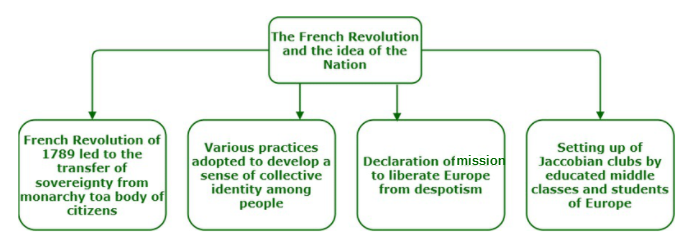法国大革命与日常生活
革命是人们的运动在任何情况下都带来了显着的变化。革命可能会以武力和流血的方式导致一个既定的政府或制度出人意料地失败,也可能因此是一种巧妙的修正,像工业革命一样缓慢而平静地到来。
法国大革命是法国及其种植园的一段社会和政治动荡时期,始于 1789 年,止于 1799 年。

法国大革命
法国大革命的起因
社会事业
- 18世纪的法国社会分为三个等级:神职人员、贵族和平民。
- 前两个阶层的人出生吉祥。
- 农民制造了大约 90 人口,即便如此,他们中只有极少数人拥有他们获得的土地。
- 大约 60% 的土地归贵族和教堂所有,他们将这些土地租给农民以获得更大的生产份额。
- 农民有义务免费为领主服务——在军队中服役,在家中和田间劳作,或参与修路。
经济原因
- 法国经济以土地收入和封建制度为基础。
- 路易十六时期,法国欠下20亿肝(法币)的债务(debt)。
- 司法管辖区从第三阶层重新征收了大量税款。
- 其中包括一种直接税,称为尾税,以及数种写在一般消费细节上的循环税。
- 前两个庄园免于付款。
- 法国的人口从 1715 年的 2300 万增加到 1789 年的 2800 万。
- 这增加了对粮食的需求。然而,产量跟不上需求,最终导致粮食价格上涨。
- 大多数工人在作坊里当工人,工资没有上涨。
- 由于吃水减少了收成,情况恶化了。
- 这导致粮食短缺或在旧政权期间开始频繁发生的生存危机。
政治原因
- 1774年,波旁王朝的路易十六渴望登上法国王位。
- 20 岁时,他与一贯干预权威的奥地利君主玛丽·安托瓦内特 (Marie Antoinette) 结婚。
- 他作为一个绝对的皇帝统治着。
- 他维持着一支庞大的军队,并在巨大的凡尔赛宫建造了一个庞大的奢华宫廷,结束了法国的财富。
革命与日常生活
任何改变要持久,都需要融入日常生活。政治人物能否改变人们的穿着、谈话和生活方式?这意味着政治改变了人们在日常生活中接受它的程度,这在 1789 年后的法国可以看到。通过法国政府,博爱、平等、自由的理念都转化为日常实践。

取消审查
在 1789 年之后的法国,男人、女人和儿童的生活发生了许多变化。革命政府指责改变了将自由与平等的对立面变成日常实践的法律。后来生效的由此产生的宪法使镇压无效。自由理想和共和派出生权是法国大革命最重要的遗产。他们在 19 世纪从法国向欧洲其他地区广播。
- 《人权和公民权利宣言》宣布言论和表达自由是一项自然权利。
- 法语审查制度被废除。书籍、报纸和戏剧现在可以在没有国王审查员批准的情况下阅读和表演。
- 1789 年夏天巴士底狱被抽烟后,镇压结束。
- 对人权和公民权利的反对将声明和表达的自决权称为与生俱来的权利。
- 杂志、小册子、书籍和出版的大屏幕淹没了法国城,他们从那里迅速在乡村漫游,描绘和描绘法国流离失所的事件和异常情况。
- 戏剧、歌曲和欢快的游行吸引了相当多的人,他们屏息凝神,与自由或正义等思想形成鲜明对比。
- 杂志、小册子、版本和印刷品淹没了法国的城市和国家
结论
- 法国大革命最重要的与生俱来的权利是自由和人民权利的典范。
- 这些在 19 世纪从法国传播到欧洲其他地区。
- 后来,这些想法相应地被印度革命者借用,如蒂普苏丹和拉姆莫汉罗伊。

法国大革命的全球影响
示例问题
问题一:法国大革命发生在什么时候?
回答:
The earliest clear articulation of super-patriotism accompanied the French Revolution in 1789. France was a full-fledged territorial state in 1789 under the rule of an arbitrary monarchy. The political and indigenous disagreement that followed in the wake of the French Revolution organized the transfer of self-dependence from the monarchy to the generality of French nationals.
问题二:革命是什么意思?
回答:
Revolution is a rudimentary revamping that happens speedily. A revolution can influence the unforeseen defeat of an established jurisdiction or system by force and bloodshed .
问题 3:请说明法国宪法的特点。
回答:
- France came to be an indigenous monarchy. The control of the king was dropped to an extreme extent.
- Instead of being condensed under the control of a single person, these officers were now separated and appointed to the separate establishments of the legislature, the superintendent, and the bar. This made France an indigenous monarchy.
- The Constitution of 1791 authorized law-making power in the National Assembly, which was later tagged i.e. citizens to suggest to a group of pickers, who in turn elected the assembly.
- Only men over the age of 25 who paid at least 3 days’ taxes of a laborer’s wages were given the right to bounty. This means that they were active citizens. The remaining men and all women were codified as irresistible citizens.
- To amend as a selector and as a member of the House a person must belong to the topmost taxpayers.
- The constitution began with the opposition to the rights of man and citizen. Rights like the right to life, freedom of speech, freedom of thought, equality before the constitution can be availed by birth by every mortal at present.
问题 4:描述革命前法国的状况。
回答:
- France was under the rule of an emperor, Louis XVI.
- All political powers were in the hands of the first two estates.
- All taxes were paid by the people of the Third Estate.
- The government was deeply indebted.
问题5:法国大革命的意义。
回答:
- The French Revolution is one of the most consequential cases on record in Europe. This was a proven achievement for the idea of a republic when it put forward the principles of liberty, equality, and fraternity.
- The greatest presentation of the French Revolution was the example of equality. The fraternity was the epitome of the new French nationalism. It was the most concentrated force in the reshaping of the borders of Europe. Total Western Europe between the Pyrenees and the Baltic became invested with the ideals of the Revolution.
- The French Revolution played an important role in the success of Greek independence (1830) as the struggle for Greek independence drew strength from the ideals of the French Revolution.
- The French Revolution also revolutionized the development of nationalism in European countries.
- The French Revolution also inspired mass movements of the nineteenth century and early twentieth century along with the nationalist passion around the world including India.